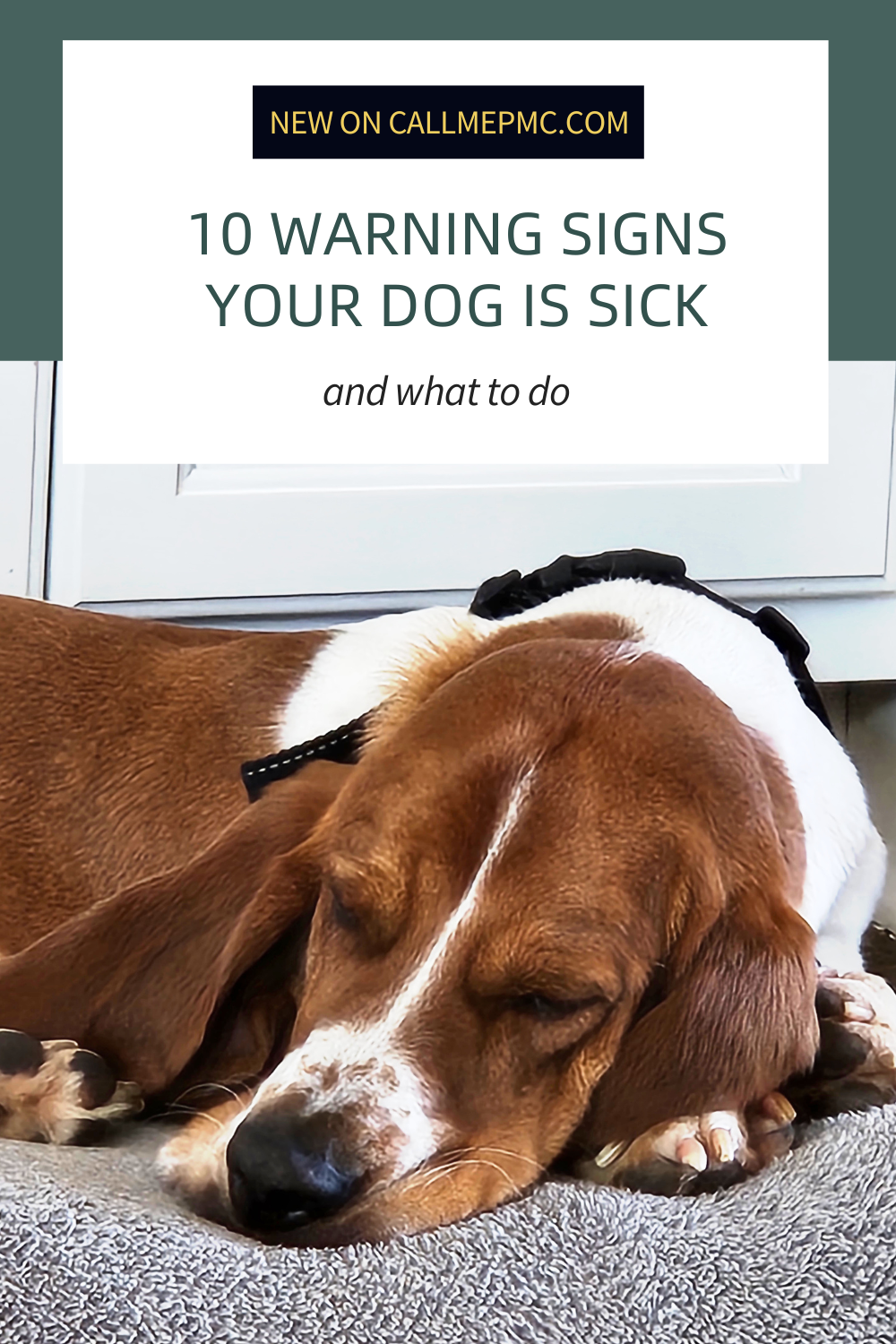10 Warning Signs your Dog is Sick
This post may contain affiliate links that won’t change your price but will share some commission.
Life would be so much easier if pets could just tell us when something doesn’t feel right. The truth is, knowing when a dog or cat is sick isn’t always simple. Pets are experts at hiding illness, and often, by the time they show obvious symptoms, they may have been struggling for quite a while.

Your first line of defense against disease is annual wellness visits and routine bloodwork.
But what about the time in between vet visits? That’s when it’s up to you to keep an eye out for subtle changes that might mean something more is going on.
10 Warning Signs your Dog is Sick
Watch your pet for early symptoms of illness in dogs and cats; they’re easy to miss. Even the smallest difference in behavior or energy level can make a huge difference in catching problems early. Don’t dismiss something as “just getting older.”
After a recent event with my Lucy, I’d like to share what I learned from my vet.

Common Signs of a Sick Pet
You know your furry friend better than anyone else. If you notice unexplained changes in their energy, habits, or behavior, it’s time to call the vet. Every dog I’ve had would throw up when sick. I didn’t have to question it or watch their behavior much because they’d start coughing, then vomit.
Here are some other symptoms to watch for:
- Vomiting or diarrhea
- Loss of appetite or weight loss
- Bad breath or unusual odors from the ears or skin
- Drinking or urinating more than usual
- Aggression or sudden behavior changes
- Trouble walking, climbing stairs, or moving around
- Struggling to pee or have a bowel movement
- Breathing problems: coughing, sneezing, panting, or difficulty breathing
- Lethargy or hiding more than normal
- Whining, crying, or unusual vocalizations
Regardless of this specific list, you know your pet, and if anything is ‘off’, take notes of their particular actions and call your vet.
Emergency Symptoms You Shouldn’t Ignore
Sometimes, the signs are clear that your pet needs urgent help. Call your vet or head to an emergency hospital right away if you notice:
- A hard, bloated belly
- Inability to urinate
- Severe vomiting and/or diarrhea
- Seizures
- Trouble breathing
- Loss of coordination or inability to stand
What to Do When Your Dog Is Sick
If you think something’s wrong, try to stay calm. Write down your pet’s symptoms and when they started. Then call your veterinarian for advice. They’ll let you know if you should schedule a regular appointment or seek emergency care.
Your vet may run tests like bloodwork, urine analysis, heartworm or tick-borne disease screenings, or an ECG to check heart rhythm. These tools help uncover what’s really going on.
I thought my dog, Lucy, had swallowed a piece of a balloon when she started coughing and throwing up. For this, the vet did an X-ray. They didn’t see any obstruction on the X-ray, so they gave her liquid barium. Barium blocks X-rays and shows up as bright white on the X-ray image. Then they did X-rays every two hours to track it moving through her gastrointestinal tract, watching for blockage.
After no obstruction was shown, they gave her meds, and we watched her for a few days. She got better and, long story short, we realized we had gotten a bad batch of dog food.
If your pet is prescribed treatment, make sure to finish all medications as directed. And don’t hesitate to call your vet again if you notice new issues or if symptoms seem to get worse.
What to do when your Dog is Sick FAQ
Q: When should I call the vet?
A: Anytime you notice sudden or unexplained changes in your pet’s appetite, behavior, energy, or bathroom habits. If symptoms are severe or include trouble breathing, seizures, or inability to move, seek emergency care immediately.
Q: How often should my pet have checkups?
A: Most veterinarians recommend at least one annual wellness exam. Older pets or those with chronic conditions may require more frequent checkups.
Q: Can subtle changes really indicate illness?
A: Yes! Even small shifts in energy, mood, or behavior can be early signs your dog is sick. Don’t ignore them, especially if they persist.
Q: Are home remedies safe if my dog is sick?
A: Never give human medications or try home remedies without consulting your vet. Some treatments can be harmful or mask symptoms of a serious problem.
Q: What should I do if my pet’s symptoms worsen?
A: Contact your veterinarian immediately. Keep a record of symptoms and any medications already given to help the vet make the best decisions quickly.

The Bottom Line
Our pets may not be able to talk, but they do communicate through changes in their bodies and behavior. The more closely you pay attention, the better chance you have of catching illness early and getting them the care they need.


What a wonderful & much needed article about pet health! It warms my heart to know that you care so much for your fur babies! We have an aging dog that is so close to our hearts & your advice is so helpful! I love your recipes & your love of your pets!
Hi Jan, thank you so much. I wasn’t looking for a dog when Lucy found me. She is a sweetheart tho and just what I needed since both my boys are away at school now. Love on that sweet baby of yours! ❤️ P